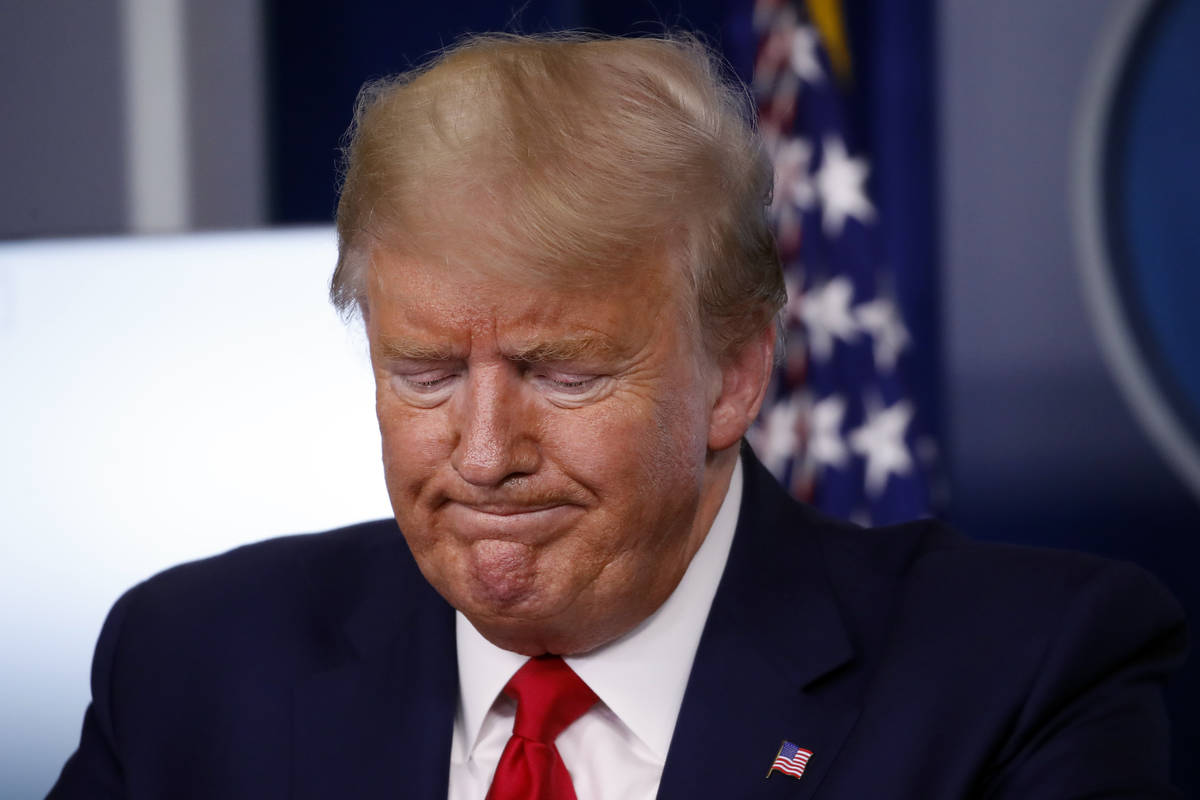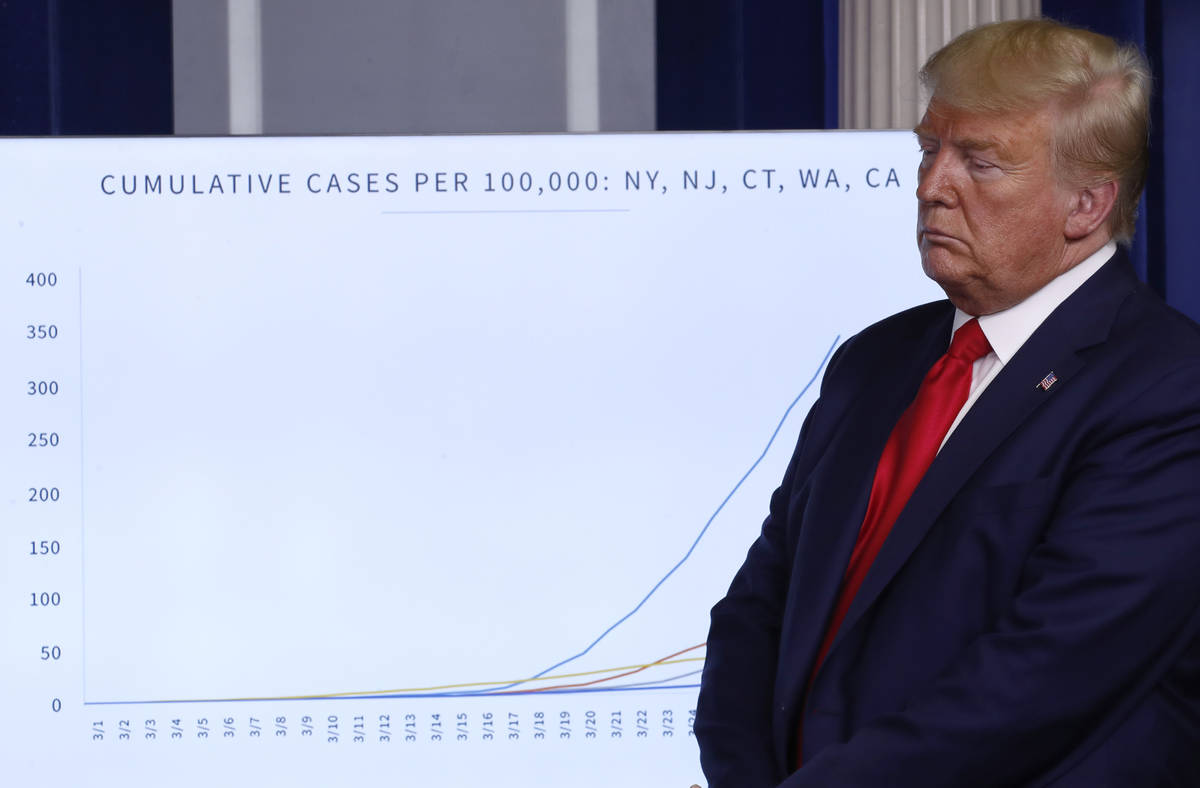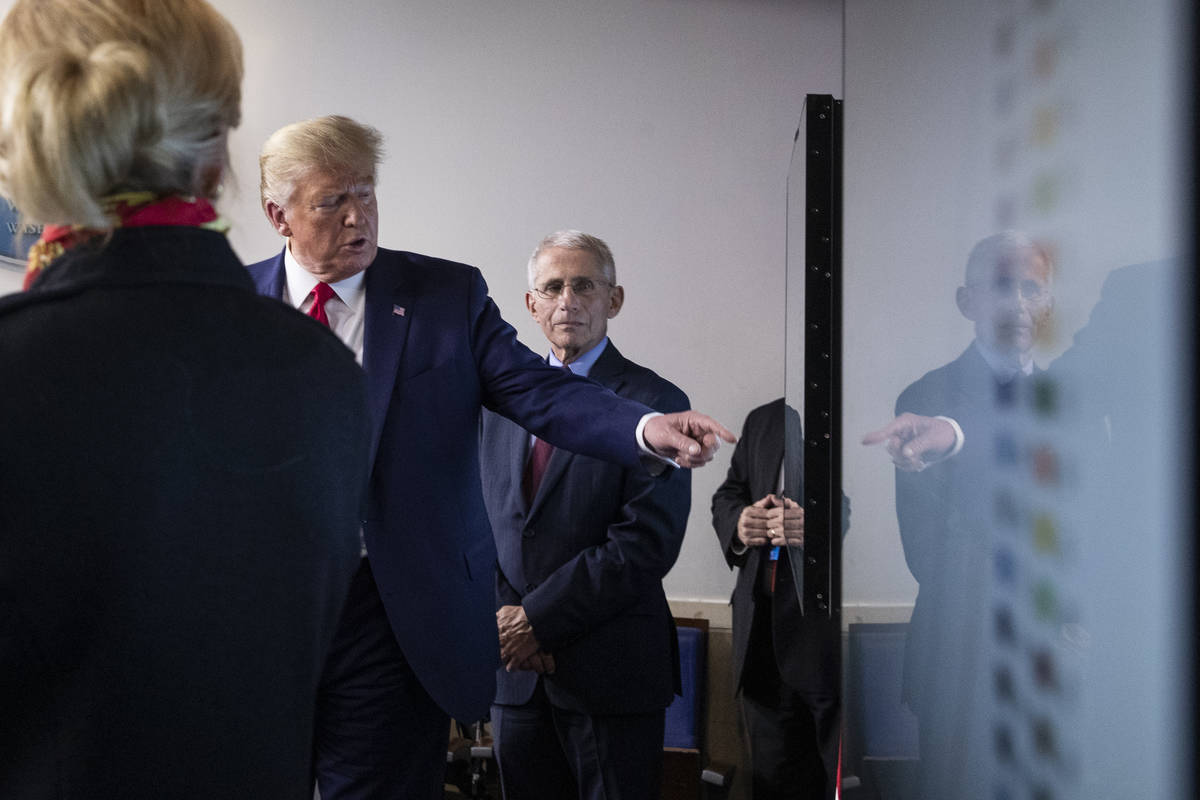Trump resists national quarantine despite death projections — Q&A
WASHINGTON — Even as he warns of a grim few weeks ahead with tens of thousands of Americans likely killed by the new coronavirus, President Donald Trump is resisting issuing a national stay-at-home order to stem the spread of the disease.
Trump said earlier this week that he and members of his administration have discussed issuing a stay-at-home order but it was “pretty unlikely” for now. Then on Tuesday the White House offered “sobering” new projections that 100,000 to 240,000 Americans will likely succumb to the coronavirus even if current social distancing guidelines are maintained.
Surgeon General Jerome Adams on Wednesday noted in a series of television interviews that the U.S. federalist system leaves much of the authority on how to properly respond to catastrophes to individual state governors and local officials.
“We trust the governors and the mayors to understand their people and understand whether or not they feel like they can trust the people in their states to make the right decisions,” Adams said on ABC’s “Good Morning America.”
The White House’s best-case projection assumes statewide stay-at-home orders, according to a senior administration official familiar with Trump’s thinking and speaking on condition of anonymity. Trump, the official said, is a believer in federalism and that it is up to individual governors to set restrictions for their states. The official noted that states are being hit by the virus with varying degrees of severity and they are best able to adapt the policies for their specific situations.
More than 235 million people live in the 33 states where governors have declared statewide shelter-in-place orders or have recommended that residents stay home.
In other states — places like Texas, Florida and Pennsylvania, among others — governors have resisted state-level decisions, but some localities have declared residents should stay at home. Those types of local orders cover Houston, Philadelphia, Atlanta, Orlando and St. Louis, along with dozens of other counties and cities.
President reluctant
Still, Trump — who has conducted long, near-daily briefings on his administration’s response to the virus outbreak over the last three weeks — has been reluctant so far to use his bully pulpit to urge governors to issue orders that would help effectively create a national quarantine.
The deference has come even as his administration has issued guidelines that have urged Americans to work from home if possible, cancel on-site learning at schools, and avoid large gatherings.
Florida Gov. Ron DeSantis, a Republican, said Tuesday that Trump’s task force has not recommended he issue a state-wide quarantine order.
“If they do, obviously that would be something that carries a lot of weight with me,” said DeSantis, a Trump ally who leads one of the largest states yet to issue statewide orders. “If any of those task force folks tell me that we should do X, Y, or Z, of course we’re going to consider it. But nobody has said that to me thus far.”
Some Q&A about the legal authority for shutting and reopening the U.S. economy
Q. Does the president have the authority to override state and local orders?
A. No. Under our constitutional system, states have the power and responsibility for maintaining public order and safety. As we’ve seen since the outbreak began, decisions about limiting social interactions by ordering people to shelter in place, closing businesses and shutting schools are being made by governors and local officials. Those same officials will make the call about when to ease up. Trump’s comments “are just advisory,” said John Malcolm of the Heritage Foundation.
An increasing number of states have ordered all nonessential businesses and schools to close at least until the end of April. “This battle is going to be much harder, take much longer, and be much worse than almost anyone comprehends. We have never faced anything like this ever before, and I continue to urge the people of our state to stay in place at home and stay safe,” Maryland’s Governor Larry Hogan said recently.
Q. But the president has set a period until the end of April in which all Americans are being urged to drastically scale back their public activities. Doesn’t that amount to a national order?
A. No. The guidelines are voluntary, and they underscore the limits on Trump’s powers. He can use daily briefings and his Twitter account to try to shape public opinion, and he has not been reluctant to do so. “When Donald Trump selects a narrative and begins to advance it, especially through his Twitter account, it has a remarkable effect on those who trust him,” said Robert Chesney, a University of Texas law professor wrote on the Lawfare blog. Florida Gov. Ron DeSantis has resisted calls to shut down the entire state, issuing orders only in four Florida counties, and said during a news conference Tuesday he’d consider a stay at home order if it were specifically recommended by the White House.
Q. Still, Trump has invoked some federal laws to address the virus outbreak, hasn’t he?
A. Yes, he has. The Stafford Act allows the expenditure of tens of billions of dollars in emergency assistance. The Defense Production Act allows the president to direct private companies to produce goods or acquire raw materials. Trump has yet to actually order companies to do anything, over the objection of some local officials who have a desperate need for ventilators, masks and other equipment. But Trump can only assert powers that Congress has specifically given him. “There are real limits on the president and the federal government when it comes to domestic affairs,” John Yoo, a University of California at Berkeley law school professor, said on a recent Federalist Society conference call. At the same time, the federal government has the power, under laws aimed at preventing the spread of communicable diseases, to quarantine people when they arrive in the United States and travel between states.
Q. Is it clear that state and local governments have authority to impose the severe restrictions we’ve seen?
A. Lawsuits already are challenging state actions on religious grounds and as seizures of property for which the government must pay compensation. But for more than 100 years, the Supreme Court has upheld states’ robust use of their authority, even when it restricts people’s freedoms. In 1905, the court rejected a Massachusetts pastor’s complaint that he should not be forced to get a smallpox vaccine or pay a fine, Malcolm noted.
Q. But we’ve seen the federal government curtail the public before, notably during World War II when people of Japanese descent, including U.S. citizens, were put into internment camps, wasn’t that the same?
A. President Franklin Delano Roosevelt used an executive order that designated certain areas as military zones to make camps. The Supreme Court in 1944 did uphold the internment in its notorious decision in Korematsu v. United States as a “military necessity” that was not based on race. In 2018, the court formally overruled Korematsu (even as it upheld Trump’s travel ban on people from several mainly Muslim countries. ) “Korematsu was gravely wrong the day it was decided, has been overruled in the court of history, and — to be clear — ‘has no place in law under the Constitution,’’’ Chief Justice John Roberts wrote.



















